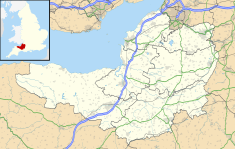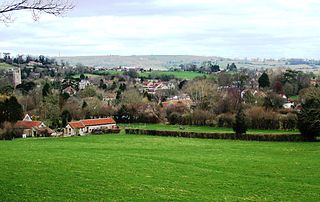
Chew Stoke is a small village and civil parish in the affluent Chew Valley, in Somerset, England, about 8 miles (13 km) south of Bristol and 10 miles north of Wells. It is at the northern edge of the Mendip Hills, a region designated by the United Kingdom as an Area of Outstanding Natural Beauty, and is within the Bristol/Bath green belt. The parish includes the hamlet of Breach Hill, which is approximately 2 miles (3.2 km) southwest of Chew Stoke itself.

Blagdon is a village and civil parish in the ceremonial county of Somerset, within the unitary authority of North Somerset, in England. It is located in the Mendip Hills, a recognised Area of Outstanding Natural Beauty. According to the 2011 census it has a population of 1,116. The village is about 12 miles (19 km) east of Weston-super-Mare on the A368 between Churchill and Compton Martin.
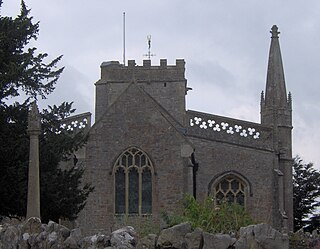
Burrington is a small village and civil parish in Somerset, England. It is situated in the unitary authority of North Somerset, 5 miles (8.0 km) north east of Axbridge and about 10 miles (16 km) east of Weston-super-Mare. The parish includes the hamlets of Bourne and Rickford and has a population of 464.
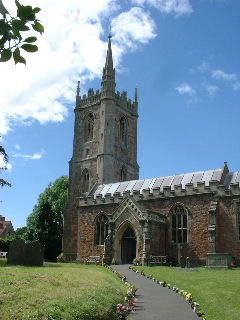
The Anglican St Andrew's Church is on the outskirts of Chew Stoke, within the English county of Somerset. The church, parts of which date from the 15th century, is a Grade II* listed building.

The Church of St Peter and St Paul dominates the village of Bleadon, Somerset, England.

The Church of the Holy Trinity in Burrington, Somerset, England, is from the 15th century and was restored in 1884. It is a Grade I listed building.

The Church of St Peter in Huish Champflower, Somerset, England dates from the 15th century, with the north aisle being built in 1534. It has been designated by English Heritage as a Grade I listed building.

The Church of St John the Baptist in Axbridge, Somerset, England, was built in the 13th century and has been designated as a grade I listed building.
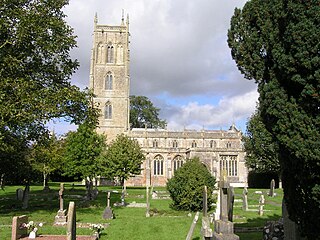
The Church of St Andrew in Cheddar, Somerset, England dates from the 14th century and has been designated as a Grade I listed building.

The Anglican Church of St Peter and St Paul in Kilmersdon, Somerset, England, dates back to the Norman period, though much of the current structure was built during the 15th and 16th centuries and restored in the Victorian era. It is a Grade I listed building.
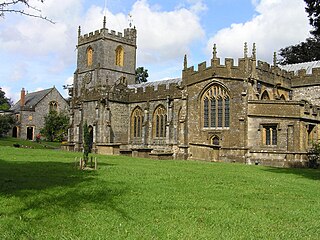
The Anglican Church of St Mary the Virgin in Chard, Somerset, England dates from the late 11th century and was rebuilt in the 15th century. It has been designated as a Grade I listed building. Due to the effects of a leak in the roof it was added to the Heritage at Risk Register in 2013.

The Church of St John the Baptist in Yeovil, Somerset, is a Church of England Parish Church.

The Church of St Andrew in Chew Magna, Somerset, England dates from the 12th century with a large 15th-century pinnacled sandstone tower, a Norman font and a rood screen that is the full width of the church. It is a Grade I listed building.

The Church of St James is a redundant church in Cameley, Somerset, England, dating from the late 12th century. It is recorded in the National Heritage List for England as a designated Grade I listed building, and is in the care of the Churches Conservation Trust. It is dedicated to St. James of Compostela. The church was declared redundant on 1 January 1980, and was vested in the Trust on 18 March 1981.

The Church of St Augustine is an Anglican parish church in Clutton Somerset, England. It was originally built around 1290, but much of it has been rebuilt since, and has been designated as a Grade II* listed building. The church is dedicated to St Augustine of Hippo.

All Saints Church in Castle Cary in the English county of Somerset dates from 1470 and is notable for its high steeple. It is a Grade II* listed building.
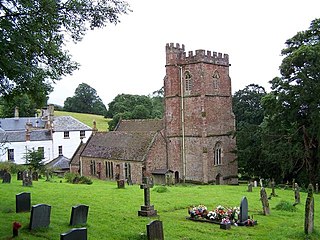
The Anglican Church of St Pancras in West Bagborough, Somerset, England was built in the 15th century. It is a Grade II* listed building.

The Anglican Church of St Mary Major in Ilchester, Somerset, England was built in the 13th century. It is a Grade II* listed building.

The Anglican Church of the Holy Cross in Babcary, Somerset, England, was built in the 14th century. It is a Grade II* listed building.

The Anglican Church of St Andrew in Aller, Somerset, England, was built in the 11th century. It is a Grade II* listed building.

